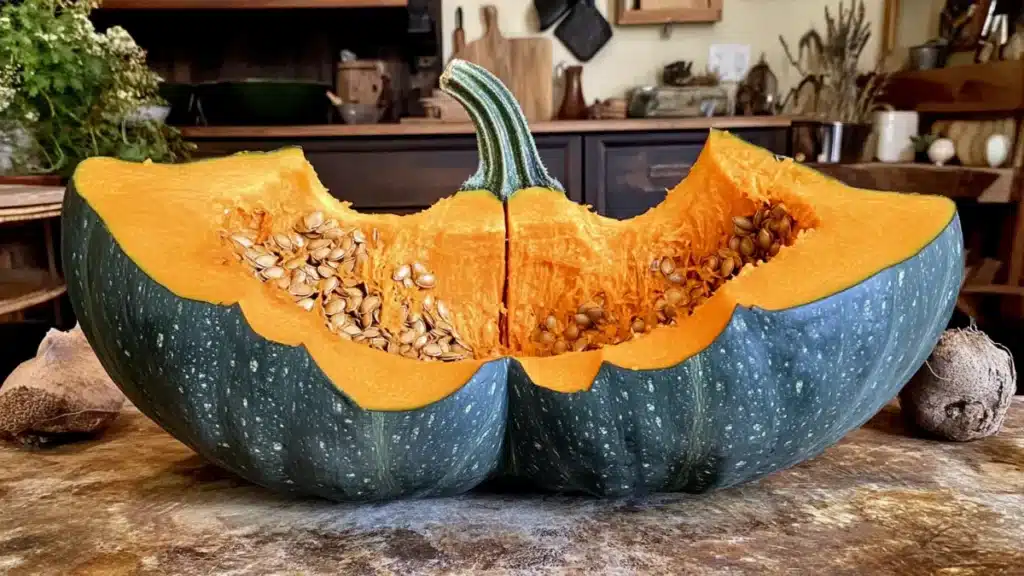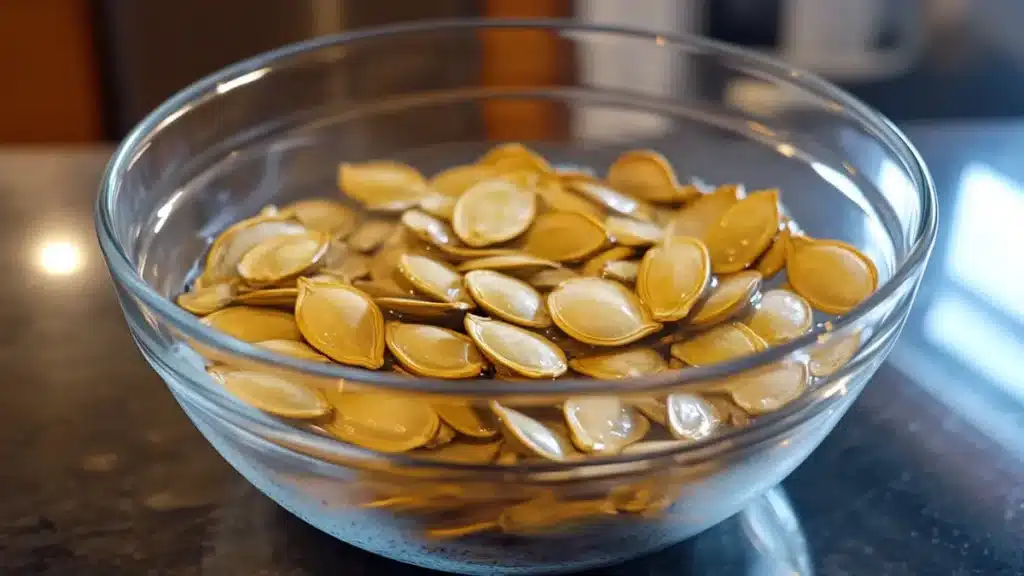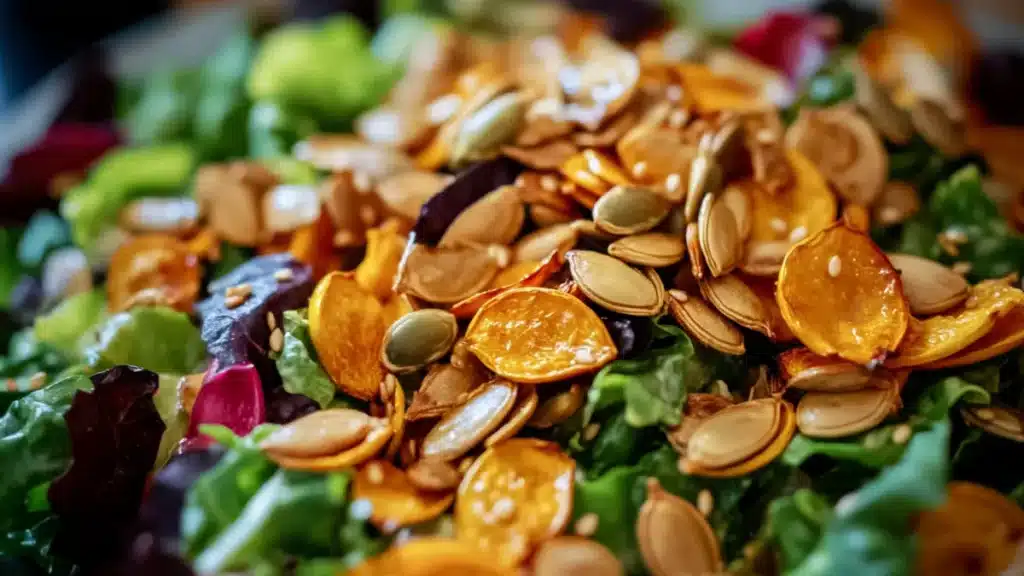In This Post
Understanding Kabocha Squash Seeds
What Are Kabocha Squash Seeds?
Kabocha squash, popularly known as Japanese pumpkin, is a winter squash that has a delicious nutty-sweet taste. This thick, green exterior holds its treasure of seeds inside it. These seeds are different from the normal oval pale seeds that have thin outer shell covering. “Can you eat kabocha squash seeds?” is a question many ask. Yes, you can!
It is like any other squash seed, say, pumpkin or spaghetti squash, but has just a little different flavor that enhances its nuttiness, which makes it most enjoyable. Roasted, their flavor just grows bolder, becomes delightful as just a snack or an ingredient in any recipe.
Now among the interesting things about kabocha seeds is that they are slightly firmer. Hence, they are perfect when roasted because they retain their shape and would crack and crunch well when you bite into one. Want to know more about the characteristics and uses of kabocha seeds? Read A Guide to Kabocha Squash Seeds.
The Nutritional Value of Kabocha Squash Seeds
Not only does it taste scrumptious, but it is also super healthy. These kabocha squash seeds are health-filled nuggets of essential nutrients that can do wonders for your health. Health fats-rich, they provide energy and aid in brain function. These are an excellent source of plant-based protein which is worth including in vegetarian or vegan diets.
They also have a good source of dietary fiber that keeps your digestive system sound and filled for a long duration. They also contain much-needed minerals like magnesium, zinc, and iron. Deficiency of these minerals affects several body functions starting from immunity and bone health to much more.
Although they are really similar to the pumpkin seeds, Kabocha squash seeds have comparable nutrition with a very different flavor. They are slightly nuttier and taste less bitter, making them a better option for snacking or using in recipes. For more info on nutritional benefits of squash seeds, think about visiting this guide on kabocha seeds.

How Do Kabocha Squash Seeds Differ from Other Squash Seeds?
It is quite true that the seeds of kabocha squash are not the only type of squash seed to have pumpkin-like appearances; they possess certain individualistic attributes. Kabocha seeds are thicker shelled than other typical squash and thus provide a pleasurable crunch on roasting. The nuts flavor also distinguishes it, enjoying a prime spot in squash fanatics.
Then again, they are smaller. The kabocha squash seeds are usually smaller and more compact than pumpkin seeds. This makes them perfect for snacking or as a topping. Whether you sprinkle them on a salad or stir them into granola, their texture and flavor shine through.
Thus, such differences make them ideal depending on the recipe or snack. And you make sure that the whole squash is used completely, thus wasting less food. Learn about other methods of using whole squash effectively by reading Mashed Potato Squash: A Tasty and Nutritious.
Are Kabocha Squash Seeds Edible?

Can You Eat Kabocha Squash Seeds Raw?
Many people ask whether kabocha squash seeds are safe raw. Reading that will convince them of the fact of the matter. The kabocha seeds, much like other squash seeds, are fully edible when eaten raw. However, they can be tough and rather chewy because of their outer shell, which may be contrary to everyone’s taste.
Raw kabocha squash seeds have a mellow, nutty flavor. Some find the crunch enjoyable, while others think it is less impressive than roasted seeds. For best results, soak the seeds to soften the shell and make for more effortless chewing. Soaking will also help to lessen any bitterness.
If you want more recipes about ways to prepare and eat squash seeds, go to A Guide to Kabocha Squash Seeds. It has the best advice on how to maximize the flavor coming from and the nutritional aspect of these seeds.
Benefits of Roasting Kabocha Squash Seeds
In fact, roasting is the most popular way of eating kabocha squash seeds. This method improves the flavor without straining one’s teeth as it requires no chewing, yet the deep-roasted flavor complements their crunch. Breaking down that outer shell with the heat of the oven has the effect of making eating the seeds a lot easier.
The roast would have a much deeper and meaty flavor than the raw ones; perfect for enjoying themselves, but also enjoyable on soups, salads, and baked dishes. Even handfuls of roasted seeds will give exciting texture and healthy nutrition to some of your favorite meals.
Roasting kabocha seeds is incredibly easy. Rinse the seeds free of all pulp, pat them dry, toss them in a little olive oil, with the seasonings of your choice-salt, pepper, garlic powder, or a little cinnamon for a sweet twist-dump them evenly on a baking sheet, and roast at350°F (175°C) for about 15-20 minutes, stirring halfway through to ensure even cooking.
If you are somewhat adventurous, try out some of those new spice mixes. For example, you may find that a combination of chili powder and lime juice gives the seeds festivals, while a sprinkle of Parmesan cheese gives them a savory touch. Roasting enhances flavor not only in kabocha squash seeds, but it also sets the ground to endless possibilities for culinary creativity.
Texture and flavor of roasted seeds
The roasted kabocha squash seeds are crunchy on the outside while their inside has a nutty and mildly sweet flavor. It becomes airy and light, making it easy to munch on. Roasted seeds do not give you that hard, fibrous feeling of raw seeds, while crunch is very pleasing to the ear and very hard to deny.
Flavor wise, roasted kabocha seeds are adaptable. Their innate nuttiness is ready to complement sweet and savory seasoning alike. For example, honey and cinnamon can easily coat them into a dessert-type snack; smoked paprika and cumin can dress them for a bold, smoky flavor.
This adaptability makes them very popular among many households. Snacking hot from the oven or splattering with a sprinkle on one of your meals, roasted kabocha seeds are sure to satisfy that craving for the flavor plus the texture.
Creative Ways to Use Kabocha Squash Seeds

Kabocha Squash Seeds in Cooking
Kabocha squash seeds are not only for snacking, but it can also be used as a star in your kitchen creations. Crunchy and nutty, it makes a perfect addition to a variety of dishes-from appetizers to desserts-and a nutritional boost to an individual’s meal.
Another common usage is their topping for salads. Roasted kabocha seeds give that wonderful crunch to fresh greens, garnished with vinaigrettes and seasonal vegetables. They are wonderful when sprinkled over several creamy soups, such as butternut squash soup or potato leek, for flavor and texture.
For a more adventurous spin, try them in baked goods. Roasted and lightly sweetened seeds can be folded into muffin or bread batter to add texture, or used as a topping to granola bars, cookies, or even oatmeal for that healthy yet flavorful crunch. If you are looking for some inspiration, this guide on kabocha squash seeds talks about the usage seeds in a variety of recipes.
Homemade Seasonings and Flavors
One of the best things about kabocha squash seeds is that they can easily be seasonable: sweet or savory, there probably is a seasoning for your taste. Homemade roasted seeds are easily made and help you to play around with flavor profiles.
Try tossing those seeds with a bit olive oil, garlic powder, some smoked paprika, and a pinch of sea salt and roast them. The combination makes a lovely smoky, bold flavor that is perfect for snacking or going into other dishes. You can also try it with curry powder or chili lime seasoning for an international flair.
Something sweet, coat the seeds in a mix of cinnamon and brown sugar with a nick of melted butter, and roast till caramelized for a treat that can rival the best at the store. Another idea is to drizzle them with honey and sprinkle some nutmeg for that warm comforting, fall-inspired flavor. Experimenting with different spices and herbs is a fun way to make roasted kabocha seeds your own. You can even create a variety of batches to suit different occasions. For more ideas, explore this guide to spaghetti squash seeds as many of these techniques can be used for kabocha, too.
Using Seeds as a Garnish
Roasted kabocha squash seeds are great for garnishing sweet as well as savory dishes. They have a different flavor and crispy texture that can elevate both the presentation and taste of your meals. Try sprinkling them over roasted vegetables, like brussels sprouts or sweet potatoes, to add that crunchiness and nutty richness.
Great foods for roasted seeds include desserts since they bring an offset to creamy or smooth textures. Roasted seeds can be added on the top of ice cream, yogurt parfaits or panna cotta. The little nuttiness of the seeds goes well with the sweetness of dessert, while the combination creates a balanced bite.
Another innovative use for kabocha seeds would be as a garnish over dips and spreads: sprinkle over the hummus, guacamole or roasted pepper dip. Small garnishes like this would make a big difference when dining either at home with family or throwing a party for guests.
Frequently Asked Questions and Final Thoughts
Frequently Asked Questions
Are kabocha squash seeds healthy?
Kabocha squash seeds are extremely healthy. They contain all essential nutrients such as proteins and healthy fats, magnesium, and zinc to support energy, bone health, and immune function. They also boast a high content in dietary fiber, which helps with digestion and provides fullness for an extended period. Therefore, a good take of kabocha squash seeds can serve as a source of extra nutrition in the diet.
Can you eat kabocha squash seeds with the shell?
Kabocha squash seeds are pretty tasty with the shell; better if they are roasted. The shell gets crisp, easy to chew after the process, and therefore contributes even more to the crunchy experience of the seed. If you find it so hard, you can roast and remove it later or soak the seeds before cooking to soften the shell. In either case, the shell has additional fibers and nutrients, so it would probably be worth adding to your snack.
How should you store kabocha squash seeds once prepared?
Put roasted kabocha squash seeds in an airtight container to keep them fresh. Ideally, they should remain stored in a cool dry pantry, and they will remain multi-weekly fresh. For longer periods of preservation, putting the container in the refrigerator can prolong retention for a month. You can also freeze roasted seeds in freezer-safe bags or containers so that you can enjoy them several months later without losing their taste or texture.
Why You Should Not Throw Away Kabocha Squash Seeds
The Environmental Benefits of Reducing Food Waste
Eating kabocha squash seeds is more than enjoying healthy snacks but lessening food waste. Most of the time, during cooking, squash seeds are thrown away, yet they are very nutritious and versatile. Including seeds in your meals will mean complete utilization of the entire squash without wastage.
Waste contributes on a large scale to environmental issues, for instance, like overloading landfills or producing greenhouse gases. By utilizing every part of your produce, you’re reducing your household waste footprint and moving toward a more sustainable lifestyle. Roasting and eating kabocha squash seeds is a small but impactful step toward mindful consumption.
Value-Packed Kabocha Seeds in Your Meal
Besides being waste reduced, kabocha squash seeds add a lot of value to your meal. They can easily be applied in just about every dish, whether snack or garnish of a soup or salad. The nutritional profile augmented to any recipe would make such a practical and delicious addition.
Having kabocha seeds in your food would also connect you to a global culinary tradition; for many peoples, roasted seeds would have been among the snacks they cherish for flavor and health. Trying this would make your meals more diverse while following a tradition rooted in smart living practices.
Final Thoughts on Kabocha Squash Seeds
This is probably the most effortless approach to finding a nutritious snack while still making a fabulous waste reduction. Tiny but powerful, these seeds are said to pack a punch of health benefits in protein, fiber, and many essential minerals. Their nutty flavor and crunchy texture allow them to be very versatile in use-from soups and salads to baked goods and beyond.
Roasting kabocha squash seeds in your home gives you the flexibility of controlling all aspects of taste and preparation. Be it savory for you or sweet-hence, there is sure to be a recipe that would match your preference. Easy and rewarding, the method allows you to blend these seeds seamlessly into your diet.
For more creative ways to use the squash seeds, visit A Guide to Kabocha Squash Seeds. This is a tips source with inspiration to get the most of these often-ignored treasures.
